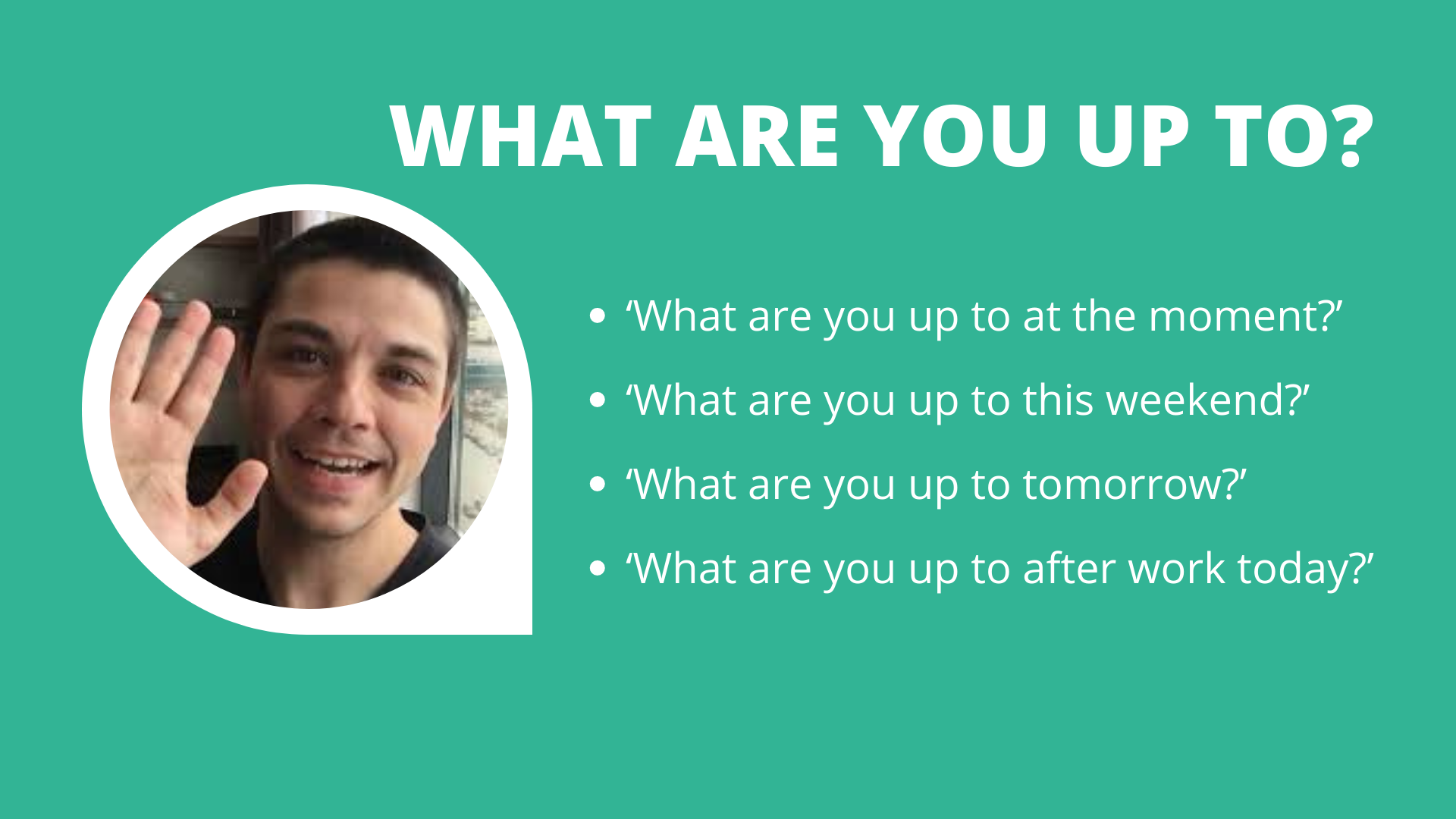What Are You Up To - Learn This English Phrase

The phrasal verb ‘up to’ has a completely idiomatic meaning. The meaning cannot be derived from either of the words. The two words ‘up to’ together mean ‘doing.’ ‘What are you up to?’ means ‘what are you doing?’
English has many phrasal verbs and it can be difficult to understand their meanings without additional help with English. Sometimes, the verb and particle give clues to the meaning of the phrasal verb like ‘eat out.’ We can understand that we eat outside of our homes. The meaning is not literal, but the idiomatic meaning can be derived from the two words.
But other times the meaning is unrelated to the verb and particle like ‘up to.’ There is nothing in these two words separately to tell us that the meaning is ‘doing.’ The meaning is not literal and it cannot be derived from ‘up’ and ‘to.’
In this blog, we will go through the meaning of ‘what are you up to?’ how it’s used and the best way to answer this question like a native English speaker.
Meaning of The Question What Are You Up To
‘What are you up to?’ is an informal question that we can ask when we want to know what someone is doing. ‘What are you up to?’ means ‘what are you doing now?’ but we can also use it with other time references to talk about the future as well.

For example:
‘What are you up to at the moment?’
‘What are you up to this weekend?’
‘What are you up to tomorrow?’
‘What are you up to after work today?’
Answers to The Question What Are You Up To
‘What are you up to?’ is a common question that can also take the place of an informal greeting. Native English speakers may say, ‘hey! What are you up to?’ to greet you. This means that you should answer ‘what are you up to?’ with an equally informal response.
It’s better to view ‘what are you up to?’ as a greeting instead of a serious inquiry into your life; short and sweet answers are your best option.
You don’t need to go into too much detail - simply find the best words to describe whatever task you are engaged in at the time of speaking.
Examples:
“Not much and you?”
“Just working. What about you?”
“Just chilling. What’s up?”
“About to go for lunch. Want to come?”
What is English Everyday
English-Everyday is an English course with live lessons for English learners who want to improve their English with native speakers, professional teachers, and students from around the world.
You have live lessons where you can join every day. You can review all record lessons. There is a calendar of scheduled lessons so you can see when lessons are and at what time you can join.
In English Everyday program, you have support and also you have student chat where you can speak with other students from all around the world. You can look at our feedback page so that you can know from which countries our students are. Before you join our program, we strongly recommend you sign up for our free seminar with Kris Amerikos, where you can learn:
- What goals you need to have to get better results
- How to become fluent in English very quickly
- What you need to do to have perfect pronunciation
- The 3 biggest mistakes you need to avoid
- Which free resources will help you learn English
- The best resource to use to improve your speaking
Funny Answers to The Question What are You Up To
“Just turning oxygen to carbon dioxide.”
“Waiting on the world to change.”
“Existing.”
“Same stuff, different day.”
“No good.”
(‘Up to not good’ means ‘doing something mischievous’)

What Are You Up Too or To
‘Too’ means ‘as well’ or ‘also,’ so ‘what are you up too?’ is not the correct form of ‘what are you up to?’ The phrasal verb ‘up to’ means ‘doing.’ ‘Up too’ is incorrect.
‘What? Are you up too?’ means ‘are you also awake now?’
‘What are you up to?’ means ‘what are you doing?’
What Are U Up To
In very informal texting, the word ‘you’ can be abbreviated to ‘u.’ The sentence ‘what are u up to?’ can only be used when texting with friends. We must never change ‘you’ to ‘u’ in formal writing.
Where You Up To
‘Where you up to?’ is the informal version of ‘where are you up to?’ This question has a different meaning from ‘what are you up to?’
‘Where are you up to?’ means ‘how much of the work have you completed?’ It’s a question we ask when we want to know how far someone has progressed in a task.
Example:
Person A: “Where are you up to?”
Person B: “I’ve just finished question 6. What about you?”
Person A: “I’m on question 9.”
Or
Person A: “Where are you up to in the movie?”
Person B: “I’m about halfway, and you?”
Person A: “I’ve finished it.”
What Are You Up To Tonight
We can use ‘what are you up to?’ to ask someone about their future plans. ‘What are you up to tonight?’ is a casual way of asking ‘what are you doing tonight?’
It’s better to ask ‘what are you up to tonight?’ when you’re interested in what a person is doing in the evening but you’re not particularly interested in doing something with the person if they aren’t doing anything tonight.
Compare:
“What are you doing tonight?” which means “I want to know if you are busy or if we could do something together.”
“What are you up to tonight?” which means “I want to know what you’re doing tonight because I’m interested or trying to make small talk.”
The difference in meaning is subtle but can be interpreted in two different ways.
So What Are You Up To
“So what are you up to?” is a great question to ask when you want to find out if someone is busy or if they are available to talk to you. If the person responds with ‘not much’ then you are welcome to stay and continue a conversation. If they say ‘I’m really busy,’ then take it as your cue to leave.
Best Answer For What Are You Up To
The best answer for ‘what are you up to?’ is ‘c This is a quick, short and sweet response. It ensures that you don’t talk the person’s ear off and it means that you don’t need to share too much information about everything you are doing.
What Are You Up To Right Now
We can ask “what are you up to right now?” if we want to know if someone is busy or not at this very moment. It can mean “are you busy at this time or can you help me?” or it can mean “I have something exciting to tell you, can you listen?”
The urgency added with ‘right now’ means ‘I want your attention at this moment. Can you give it to me?’
Whatcha up too
“Whatcha” is the spoken abbreviation of ‘what are you’ It is common for native English speakers to mesh as many words together as possible. This is called reduction.
As with most spoken English, the reduction has a written form. The reduction is very casual and can only be used in very informal texting and informal speaking.
‘Too’ is not the correct adverb to use in this question because the phrasal verb is ‘up to’ NOT ‘up too.’
In informal writing like texting, you might see native English speakers write ‘whatcha up 2?’ because ‘two’ has the same pronunciation as ‘to’ and ‘too.’ This can lead to confusion when writing the full form.
As an English language learner, it’s important to pay close attention to the difference between informal written and spoken English and formal English writing and speaking.









































